In his commentary on Habakkuk, Calvin comments that the difference between justification on the basis of faith, and justification on the basis of one’s own works, indicates not only a distorted view of God and salvation, but also betrays a misguided interpretative principle for one’s own self, and for the world. Moreover, Calvin contends, it is only with the appropriate lens of interpretation – justifying faith in Jesus Christ – that any man will ever find rest in this life, in the midst of evil, sin, and suffering.
The prophet Habakkuk says to the LORD, “You make mankind like the fish of the sea, like crawling things that have no ruler.” (Hab. 1:14), and then asks about the destruction that some men cause, “Is he [God allowing the Assyrians] then to keep on emptying his net and mercilessly killing nations forever?” Habakkuk is essentially asking, in Calvin’s paraphrase, “How long, O Lord, wilt thou permit the Assyrians to proceed to new plunders, so as to be like the hunter, who after having taken a boar or a stag, is more eager, and immediately renews his hunting; or like the fisherman, who having filled his little ship, with more avidity pursues his vocation? Wilt thou, Lord, he says, suffer the Assyrians to become more assiduous in their work of destruction?” Habakkuk is wrestling with the problem of God and evil, especially in light of the growing oppression and threat of the Assyrians. The LORD answers Habakkuk (Hab. 2:3-4):
“Write the vision;
make it plain on tablets,
so he may run who reads it.
For still the vision awaits its appointed time;
it hastens to the end—it will not lie.
If it seems slow, wait for it;
it will surely come; it will not delay.
Behold, his soul is puffed up; it is not upright within him,
but the righteous shall live by his faith.”
Calvin comments on how the phrase “the righteous shall live by his faith” (2:4) actually answers Habakkuk’s question:
This verse stands connected with the last, for the Prophet means to show that nothing is better than to rely on God’s word, how much soever may various temptations assault our souls. We hence see that nothing new is said here, but that the former doctrine is confirmed — that our salvation is rendered safe and certain through God’s promise alone, and that therefore we ought not to seek any other haven, where we might securely sustain all the onsets of Satan and of the world. But he sets the two clauses, the one opposed to the other: every man who would fortify himself would ever be subject to various changes, and never attain a quiet mind; then comes the other clause — that man cannot otherwise obtain rest than by faith.
Calvin then juxtaposes the one who has faith and the one who does not have faith. Regarding the one who receives the blessings of the LORD by faith – “a quiet mind,” as Calvin eloquently puts it – he is to be understood according to a single principle:
But this principle ought ever to be remembered — that whatever benefits the Lord confers on the faithful in this life, are intended to confirm them in the hope of the eternal inheritance; for however liberally God may deal with us, our condition would yet be indeed miserable, were our hope confined to this earthly life. As God then would raise up our minds to the hopes of eternal salvation whenever he aids us in this world, and declares himself to be our Father; hence, when the Prophet says that the faithful shall live, he certainly does not confine this life to so narrow limits, that God will only defend us for a day or two, or for a few years; but he proceeds much farther, and says, that we shall be made really and truly happy; for though this whole world may perish or be exposed to various changes, yet the faithful shall continue in permanent and real safety. Hence, when Habakkuk promises life in future to the faithful, he no doubt overleaps the boundaries of this world, and sets before the faithful a better life than that which they have here, which is accompanied with many sorrows, and proves itself by its shortness to be unworthy of being much desired.
Describing the “puffed up” whose “soul . . . is not upright within him,” Calvin says,
Men indeed glory in a foolish conceit as to their own righteousness: but all philosophic virtues, as they call them, which men think they possess through free-will, are mere fumes; nay, they are the delusions of the devil, by which he bewitches the minds of men, so that they come not to God, but, on the contrary, precipitate themselves into the lowest deep, where they seek to exalt themselves beyond measure. However this may be, let us be fully convinced, that in man there is not even a particle either of rectitude or of righteousness; and that whatever men may try to do of themselves, is an abomination before God.
Calvin closes his descriptive contrast of those with faith, and those without, with a prayer. What is particularly helpful about this prayer is Calvin’s balance between admonishment and comfort (1 Thess. 5:14), between addressing sin without and sin within, and interpreting it all through the framework that Scripture provides: no evil is ever outside of God’s power or foreordained plan for the world, and unless we find rest in Christ, we will never find respite in our suffering in its presence:
Grant, Almighty God, that as the corruption of our flesh ever leads us to pride and vain confidence, we may be illuminated by thy word, so as to understand how great and how grievous is our poverty, and be thus taught wholly to deny ourselves, and so to present ourselves naked before thee, that we may not hope for righteousness or for salvation from any other source than from thy mercy alone, nor seek any rest but only in Christ; and may we cleave to thee by the sacred and inviolable bond of faith, that we may boldly despise all those empty boastings by which the ungodly exult over us, and that we may also so cast ourselves down in true humility, that thereby we may be carried upward above all heavens, and become partakers of that eternal life which thine only begotten Son has purchased for us by his own blood. Amen.














